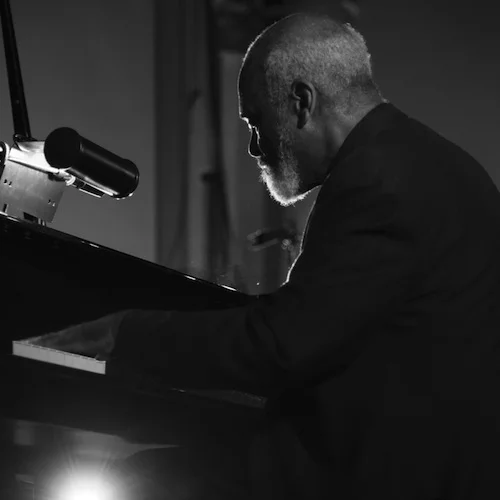By Filipe Freitas
Cooper-Moore at Vision 21, 2016 ©Clara Pereira
Name: Cooper-Moore
Instrument: piano, harp, hand-crafted instruments
Style: avant-garde jazz, contemporary jazz
Projects: Digital Primitives, Black Host, William Parker's In Order to Survive.
American pianist Cooper-Moore will be at the Arts For Art's Vision Festival 22 on May 29th with three different projects. This year the Festival is honoring him with the Lifetime Achievement Award.
You've been a constant presence in the Vision Festival, which by itself is an achievement.
What does this Festival, and especially this Lifetime Achievement Award, represent to you?
It’s a high honor. It is recognition by some, that during my life I’ve in some way been a contributor to and instrumental in the creation and growth of the communities where I have been a part. Being selected for a lifetime achievement award for this year’s Vision 22 Festival is especially rewarding in that I have always believed in the goals of Arts for Art and the Festival from their beginnings.
Besides Digital Primitives and Gerald Cleaver's Black Host, which are relatively recent projects, you'll be playing with William Parker's In Order to Survive, just like it happened almost 20 years ago in Vision 1.
What do you think are the main changes both in the festival and in the way you make music?
Digital Primitives goes back 15 or 16 years, not recent. It happens to be the ensemble with which I have most recorded, toured and performed, of the three that I’ll be performing in on May 29th at Judson Church.
Producing the Festival cost a lot more money.
It is shorter by half or more.
The Festival pays better than it did 20 years ago and has, by its pay policy example, been instrumental in increasing the fees that musicians are awarded in some of the newer created festivals in New York City.
The audiences are older.
I perform with fewer and fewer people.
I am more efficient in my playing. I know where I want to go when I begin to play. There are people who say, “Come, and let’s take a trip, a musical journey.” They say that they don’t know where the journey will take them or us. That might be how I was in the distant past. But as an elder of the music, that is not how I feel anymore.
What made you choose avant-garde/free jazz in detriment of bop variations and mainstream?
Avant-garde/free jazz are not terms which I have ever labeled myself. When I was twelve years old and started listening to the music it was labeled progressive. What I do is for me a next step. The music has never stayed the same. It has always moved on, standing on the shoulders of those who have gone before. Labels are often a problem in that they infer judgment, hierarchy, and status.
The music that I play is nearly all blues based. Blues is music that I grew up listening to. In my mid-teens, I heard Ornette Coleman and John Coltrane and Thelonious Monk. They were all playing music that was obviously blues based. It was new blues. Teens are always looking for something new. So I started playing from those roots.
How tough can be the life of an alternative jazz musician in NY? Any advice for the younger musicians who are giving their first steps?
I do not consider myself an alternative anything. I am a musician. But your question might suggest that those who follow a more traditional, conservative path, to how the music has grown and progressed, are practicing that which is alternative. What most people listen to is what they are in the habit of listening to. This habit of listening, just like the diet of most folks, is formed early in life and is not easily changed.
But to your questions: Life for any artist in America can be tough. The creative life makes us vulnerable to many of the difficulties of life. The best way to do what you want to do is to hang out with the folks who do what you want to do. Learning from a mentor or in an apprenticeship is the best way to move ahead as a young creative artist. Work on doing what you want to do as much as you can. Be obsessed.
You not only play a bunch of different instruments but you also design and build them. Where did this passion come from?
Building instruments is not a passion. I build an instrument if an idea for one comes to me that I believe I can make manifest in a short length of time, a day or two. Or I build because I have to replace one that is broken or no longer playable.
What other styles do you listen to? Tells us your favorite musician for each style.
First, I am my favorite musician.
I don’t listen to music other than the music that I am creating unless it’s music that I have to learn. Then I drown my ears and my brain in it.
Tell me 2 persons who marked you the most as a musician.
Both were born and raised in Washington DC, where I spent a lot of time: Duke Ellington and Lawrence “Fox” Wheatley
Tell me 2 musicians whom you've never worked with, but you'd like to.
None

